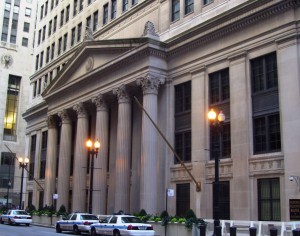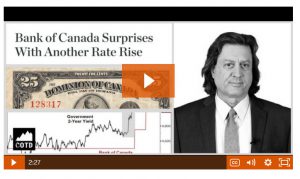It is widely held that a growing economy requires a growing money stock because economic growth increases demand for money. Many economists also believe that failing to accommodate the increase in the demand for money leads to a decline in consumer prices. This could destabilize the economy and produce an economic recession or even a depression. Some economists who follow Milton Friedman—also known as monetarists—want the central bank to target the money supply growth rate to a fixed percentage. They hold that if this percentage is maintained over a prolonged period, it will create economic stability. The idea that money must grow to support economic growth implies that money sustains … [Read more...]
How Loose Monetary Policies Cause Recessions
Advocates of Keynesian economics believe the Federal Reserve should pursue policies that will prevent the possible decline of the economy into a liquidity trap. But what is a liquidity trap? Economic activity often is presented in terms of a circular flow of money. Spending by one individual becomes part of the earnings of another individual, and spending by another individual becomes part of the first individual’s earnings. Recessions, by this thinking, occur because consumers—for whatever reason—have decided to cut spending and increase their savings. For instance, if people become less confident about the future, they are likely going to lower their outlays and hoard money. … [Read more...]
What are Central Banks?
History of Central Banking Like everyone, kings like to spend money, whether it is to wage war or to build palaces, but they often didn't have all the money they "needed", so they had to borrow it. To facilitate this large scale borrowing, they created a Central Bank to handle that function. In 1790, "Federalist" Alexander Hamilton advocated for a Central Bank in the United States. Democratic-Republicans, Thomas Jefferson and James Madison believed that the Constitution did not grant the Federal government the authority to create a bank, based on the 10th amendment i.e. that all powers not endowed to Congress are retained by the States (or the people). But Hamilton argued that although … [Read more...]
Believe Your Own Eyes: Central Banks FOLLOW the Market
Many investors believe that the market follows the FED's monetary leadership. This sounds right because the FED is the 500 pound gorilla in the market right? It has Trillions of dollars at its disposal and isn't afraid to use it. But is this actually the case? Believe Your Own Eyes: Central Banks FOLLOW the Market By Elliott Wave International 3 Videos + 8 Charts = Opportunities You Need to See. Join this free event hosted by Elliott Wave International and you'll get a clear picture of what's next in a variety of U.S. markets. After seeing these videos and charts you will be ready to jump on opportunities and sidestep risks in some major markets. This free … [Read more...]





